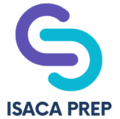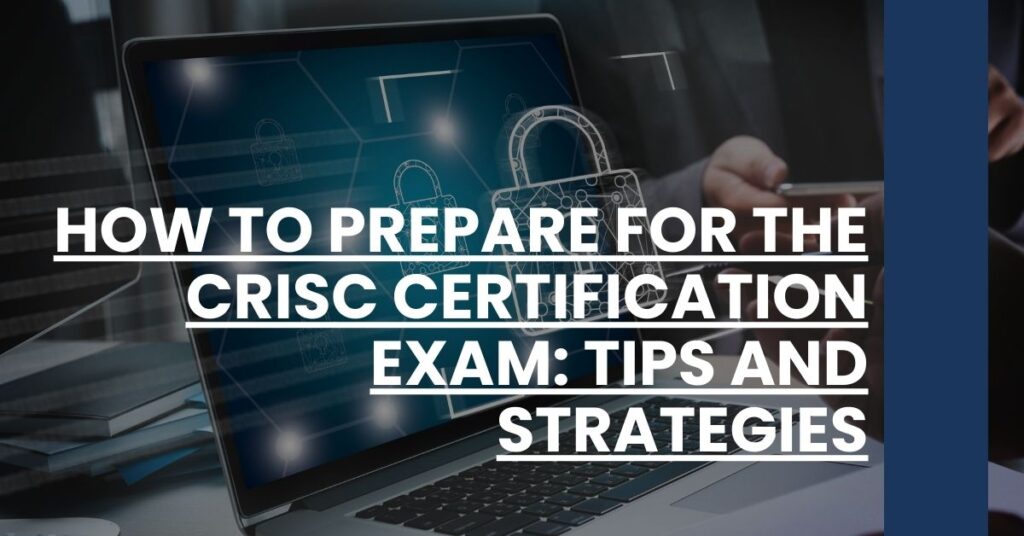Are you tackling the CRISC exam and looking for actionable strategies to enhance your chances of success?
Navigating this challenging arena requires more than luck—it demands a strategic approach and tried-and-true crisc exam tips.
Our article distills expert insights into powerful, practical advice that’ll prepare you to ace the exam with confidence. Forget generic guidance; we’re providing focused techniques to elevate your preparation.
- 1. Understand the CRISC Exam Structure
- 2. Develop a Study Plan
- 3. Choose the Right Study Materials
- 4. Utilize Practice Tests Effectively
- 5. Join Study Groups and Forums
- 6. Allocate Time for Review
- 7. Take a CRISC Review Course
- 8. Focus on Understanding, Not Memorization
- 9. Manage Your Time During the Exam
- 10. Stay Calm and Confident on Exam Day
- ISACA Resources and Certification Guidance
- Create a Balanced Lifestyle
- Conclusion: Embrace the Journey to CRISC Certification
1. Understand the CRISC Exam Structure
Before diving into the nuts and bolts of CRISC exam preparation, you should have a firm grasp of the exam structure. The CRISC (Certified in Risk and Information Systems Control) exam is designed to evaluate your expertise and knowledge across four domains: Governance, IT Risk Assessment, Risk Response and Reporting, and Information Technology and Security. These domains don’t carry equal weight—so here’s how they’re broken down:
- Governance: 26%
- IT Risk Assessment: 20%
- Risk Response and Reporting: 21%
- Information Technology and Security: 33%
Understanding the weight of each domain will help you gauge where to focus your energy. The CRISC exam also consists of 150 multiple-choice questions, which you’re expected to tackle within 4 hours. Realizing how the time correlates with the number of questions can give you an edge in managing your time effectively.
2. Develop a Study Plan
Talking about CRISC exam tips, one of the unbeatable strategies is structuring a study plan that’s as unique as you are. How do you absorb material best? And when are you most alert? Reflect on these questions, because a crafted study plan that mirrors your personal learning preferences and daily routine sets you up for success. Your study timeline should include:
- Realistic Goals: Don’t cram your schedule. Set attainable study periods.
- Prioritization: Give more time to complex topics.
- Regular Milestones: Weekly targets keep you on track.
- Plan Adjustments: Stay flexible and adapt as needed.
Consistency is king when it comes to retaining complex theories and applying them to real-world scenarios. A structured study plan also ensures you won’t be overwhelmed as your exam date approaches.
3. Choose the Right Study Materials
Selecting the right study materials could be the deal-breaker between passing and failing. It’s crucial to choose up-to-date resources that cover the entirety of the CRISC curriculum. While the internet might be oversaturated with materials, ISACA themselves offer a slew of endorsed resources, such as the CRISC Review Manual and the CRISC Review Courses, which are tailormade to align with the exam’s latest developments.
Don’t ignore third-party materials, but beware of their publication date and relevance to the current exam structure. Here’s where you should focus:
- ISACA’s Official Resources: These are specifically designed with the exam in mind.
- Recognized Learning Providers: Courses and books from reputable sources.
- Tech Forums and Peer Discussions: Gain insight from those also in the trenches of exam prep.
4. Utilize Practice Tests Effectively
One of the most impactful CRISC exam tips is to make practice tests your ally. Why? Because they offer a simulation of the real exam environment that’s invaluable. Practice tests help you identify weak spots in your knowledge and get comfortable with the exam’s level of difficulty. Here’s how you can make the most of them:
- Benchmarking: Use practice tests to gauge how well you might perform on the actual exam.
- Identifying Knowledge Gaps: Focus subsequent study sessions on areas where your performance drops.
- Exam Environment Familiarization: Get used to the pressure of timed conditions.
ISACA provides a repository of CRISC practice quizzes to help you prepare. Regularly engaging with these will sharpen your test-taking skills and bolster your confidence.
5. Join Study Groups and Forums
Preparation doesn’t have to be a solitary road. Joining study groups and forums is a great way to expand your support network and to share knowledge with peers who understand the struggle. Collaborative learning can bring new perspectives and strategies that you might have missed on your own. Here’s where networking becomes beneficial:
- Sharing Study Tips: Exchange strategies that work and talk about common challenges.
- Clarification of Doubts: Get quick answers to confusing topics from peers or experts.
- Motivation and Support: Stay inspired by others’ progress and encouragement.
Platforms like ISACA online forums provide a professional community space where you can start discussions, ask questions, and provide insights to others preparing for the CRISC exam.
6. Allocate Time for Review
One can’t overstate the significance of review sessions. They help solidify your grasp of the materials and enhance long-term retention. Unlike initial learning, where the focus is on breadth, review sessions allow you to delve deeper into each topic. Distribute review periods throughout your study plan, paying attention to:
- Regular Intervals: Frequent reviews strengthen memory recall.
- Focused Sessions: Concentrate on weak areas identified through practice tests.
- Mixed Review: Cover a blend of topics in each session to keep your brain agile.
Remember, the key to an effective review is formulating a strategy that incorporates a variety of revisiting intervals, from daily to weekly, ensuring you don’t just recognize information but actually understand and remember it.
7. Take a CRISC Review Course
When your aim is to conquer the CRISC exam, why not arm yourself with all the resources at your disposal? This is precisely where a CRISC review course fits into your arsenal of crisc exam tips. These courses are designed to streamline your study process, ensuring you focus on the most relevant content.
- Structured Learning: Courses provide a comprehensive framework that helps manage your time and efforts.
- Expert Instruction: Leverage insights from instructors who’ve mastered the content and understand the exam intricacies.
ISACA offers resources like an Online Review Course that bring you up to speed on the most current CRISC domain knowledge. Though not a replacement for self-study, consider these courses as a powerful supplement to your self-guided efforts.
8. Focus on Understanding, Not Memorization
The cornerstone of your CRISC journey is a deep and intuitive understanding of risk management and control principles, rather than relying solely on rote memorization. Let’s delve into why this matters:
- Real-World Application: The CRISC exam assesses your ability to apply concepts in practical scenarios, not just recall facts.
- Long-Term Mastery: Understanding fosters the type of knowledge that sticks with you well past the exam date.
Align your study strategy with this approach. When you grasp the “why” behind a concept, you’re better equipped to handle curveball questions that require critical thinking.
9. Manage Your Time During the Exam
You’ve studied hard and now face the final hurdle: the exam itself. Efficiently managing your time while you navigate through those 150 questions could make a significant difference in your performance. Time management is a soft skill that often gets overlooked but is among the essential crisc exam tips.
- Strategic Approach: Tackle questions in order of confidence — answer sure-bets first, then circle back to challenging ones.
- Pacing: Keep a steady rhythm, ensuring you don’t spend too long on any single question.
- Final Review: Leave a buffer for revisiting flagged questions and ensure all answers are reviewed and complete.
Remember, the CRISC exam is not just a test of knowledge but of strategy and timing as well.
10. Stay Calm and Confident on Exam Day
On the day of your CRISC exam, maintaining a calm and collected demeanor is your secret weapon. Just like athletes before a big game, your mental preparation is just as critical as your academic preparation.
- Rest Well: A good night’s sleep can sharpen your cognitive functions and focus.
- Nutritious Meal: Fuel your brain with a healthy meal before the exam.
- Confidence Building: Remind yourself of the efforts you’ve put in and trust your preparation.
These steps will help ensure that you are at peak performance when you sit for the exam.
ISACA Resources and Certification Guidance
Navigating the ISACA website reveals a treasure trove of resources set to enhance your study regimen. From detailed outlines to forums for peer learning, these resources are central to our crisc exam tips.
- Content Outline: The CRISC exam content outline offers clues to the exam structure, topics, and weighting.
- Candidate Guide: ISACA’s guide includes comprehensive insights on exam registration, scheduling, and preparation.
Harness these resources to streamline your study sessions and gain clarity on the larger expectations of the CRISC certification journey.
Create a Balanced Lifestyle
Developing a healthy balance during your exam prep is not just about understanding theories; it’s about creating a sustainable lifestyle that encourages mental and emotional well-being.
- Regular Breaks: Integrating breaks helps maintain focus and prevents burnout.
- Physical Activity: Regular exercise can reduce stress and enhance cognitive function.
- Mindfulness Techniques: Mindfulness or meditation can support greater focus and mental clarity.
Incorporating these balance-focused habits ensures you’re not just preparing to pass an exam—you’re setting the foundations for a lifetime of professional success.
Conclusion: Embrace the Journey to CRISC Certification
Approaching the CRISC exam with a mix of diligence and strategy sets the stage for a successful result. Every tip—from familiarizing yourself with the exam structure to engaging in a final review course—contributes to a comprehensive approach, fortifying your readiness.
Reflect on these tips as stepping stones, not only toward CRISC certification but also for advancing your career in risk management. Embrace the process and remember, the journey of preparation is just as critical as the destination. Your hard work, combined with strategic exam tactics, culminates in the kind of expertise recognized and respected industry-wide.

